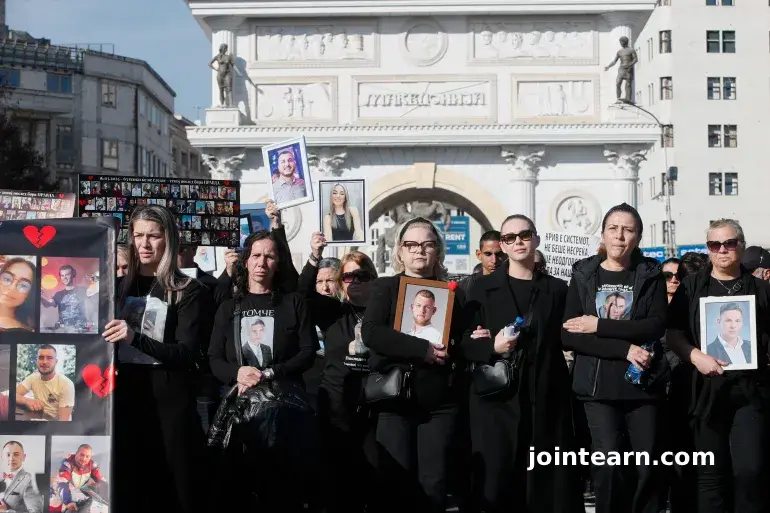
Thousands of protesters marched through Skopje, the capital of North Macedonia, on Saturday, demanding justice for the 63 victims of the Pulse nightclub fire in Kocani earlier this year. The rally comes ahead of the trial of 34 individuals and three companies charged in connection with the blaze, which is the deadliest in North Macedonia’s history.
The Deadly Pulse Nightclub Fire
The tragic fire occurred on March 16, 2025, during a hip-hop concert at the Pulse club in Kocani, a small town in eastern North Macedonia. A pyrotechnic flame ignited the club’s roof, causing panic and a stampede that killed 63 people and injured around 200 others.
Most victims were young adults, aged between 16 and 26, making the fire particularly devastating for local communities. Authorities have cited serious safety violations at the unlicensed venue as contributing factors.
Protesters Demand Accountability
Relatives of the victims and supporters dressed in black carried a large banner featuring photos of the deceased, with the words: “63 shadows will be following you.” Chants of “justice for Kocani” echoed through the streets as protesters marched toward the North Macedonian parliament.
Natalija Gjorgjieska, who lost her husband, musician Andrej Gjorgjieski, in the fire, expressed frustration over systemic failures:
“We demand the truth. Where did the mistakes occur, who didn’t respond, which institutions were late, who had the responsibility to prevent [them] and did not?”
Charges and Legal Proceedings
The prosecution has filed indictments against:
- The club owner
- Security personnel
- Former mayors of Kocani
- Representatives of three legal entities, including the security company and the owner’s firms
The defendants face charges for serious crimes against public security, with potential sentences of up to 10 years in prison if convicted. Additional defendants include inspectors, civil servants, and former economy ministers, reflecting widespread allegations of negligence and corruption.
Corruption and Safety Concerns
Corruption remains a persistent issue in North Macedonia, with the country ranked 88th globally on the Corruption Perceptions Index last year. Transparency International notes that bribes and skipped inspections are common, allowing venues to avoid licensing requirements and safety regulations.
The European Union has repeatedly warned that pervasive corruption is a major barrier to North Macedonia’s EU accession, a process the country has pursued since 2005.
Key Takeaways
- Thousands rallied in Skopje ahead of the Pulse nightclub fire trial, demanding justice for 63 victims.
- The fire in Kocani, caused by pyrotechnics and safety violations, injured 200 people.
- 34 individuals and three companies face criminal charges for negligence and public safety violations.
- Corruption in North Macedonia is widespread, impacting licensing, inspections, and public safety.
- The EU continues to cite corruption as a key obstacle to the country’s membership aspirations.


Leave a Reply